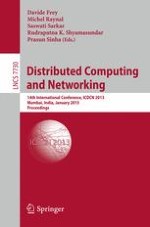2013 | OriginalPaper | Buchkapitel
Dealing with Undependable Workers in Decentralized Network Supercomputing
verfasst von : Seda Davtyan, Kishori Konwar, Alexander Russell, Alexander Shvartsman
Erschienen in: Distributed Computing and Networking
Verlag: Springer Berlin Heidelberg
Aktivieren Sie unsere intelligente Suche, um passende Fachinhalte oder Patente zu finden.
Wählen Sie Textabschnitte aus um mit Künstlicher Intelligenz passenden Patente zu finden. powered by
Markieren Sie Textabschnitte, um KI-gestützt weitere passende Inhalte zu finden. powered by
Internet supercomputing is an approach to solving partitionable, computation-intensive problems by harnessing the power of a vast number of interconnected computers. This paper presents a new algorithm for the problem of using network supercomputing to perform a large collection of independent tasks, while dealing with undependable processors. The adversary may cause the processors to return bogus results for tasks with certain probabilities, and may cause a subset
F
of the initial set of processors
P
to crash. The adversary is constrained in two ways. First, for the set of non-crashed processors
P
−
F
, the
average
probability of a processor returning a bogus result is inferior to
$\frac{1}{2}$
. Second, the adversary may crash a subset of processors
F
, provided the size of
P
−
F
is bounded from below. We consider two models: the first bounds the size of
P
−
F
by a fractional polynomial, the second bounds this size by a poly-logarithm. Both models yield adversaries that are much stronger than previously studied. Our randomized synchronous algorithm is formulated for
n
processors and
t
tasks, with
n
≤
t
, where depending on the number of crashes each live processor is able to terminate dynamically with the knowledge that the problem is solved with high probability. For the adversary constrained by a fractional polynomial, the time complexity of the algorithm is
$O(\frac{t}{n^\varepsilon}\log{n}\log{\log{n}})$
, its work is
O
(
t
log
n
loglog
n
) and message complexity is
O
(
n
log
n
loglog
n
). For the poly-log constrained adversary, the time complexity is
O
(
n
), work is
O
(
t
poly
log
n
), and message complexity is
O
(
n
poly
log
n
). All bounds are shown to hold with high probability.
